Unit 6 单元复习课
2022-2023学年第二学期仁爱英语七年级下册Unit6复习课

语法加油站
重点知识点
• 1. in front of与in the front of的区别 • in front of 在……的前面(在范围之外的前面) • in the front of在……的前面(在范围内的前面) eg:
• There is a pool _in__f_ro_n__t _o_f_his house. (在...外面)
17. 在交通事故中___i_n__t_ra__ff_i_c__a_c_c_i_d_e__n_t_s_____ 18. 遵守交通规则___o__b_e_y__t_h_e__t_r_a_f_fi_c__r_u_l_e_s___ 19. 看两边 _________l_o_o__k_b__o_t_h__w__a_y_s_________ 20. 在街上玩________p_l_a_y__o_n__t_h_e__s_t_r_e_e_t______ 21. 我们所有人 _____a_l_l _o_f__u_s_________________ 22. 超速罚款单_____a__t_i_c_k_e_t__f_o_r_s__p_e_e__d_in__g___ 23. 不要迟到。_____D__o_n__’t__b_e__l_a_t_e_.__________ 24. 小心____________b_e__c__a_r_e_f_u_l_______________
9. 失去生命_______lo__s_e__o_n__e_’s__l_i_fe___________ 10. 需要做某事___n__e_e_d__t_o__d_o__s_t_h__. __________ 11. 保证安全 _____k_e_e_p___s_a_f_e_________________ 12. 换乘2路公交车c_h__a_n_g__e__to__t_h__e_N__o_._2__b_u__s__ 14. 受伤__________g_e__t/_b_e__h__u_r_t_______________ 15. 禁止右转。___N__o__r_ig__h_t_t_u__rn__._____________ 16. 禁止停车。___N__o__p_a_r_k__in__g_._______________
PEP人教版小学英语三年级下册Unit6Howmany复习课教学设计
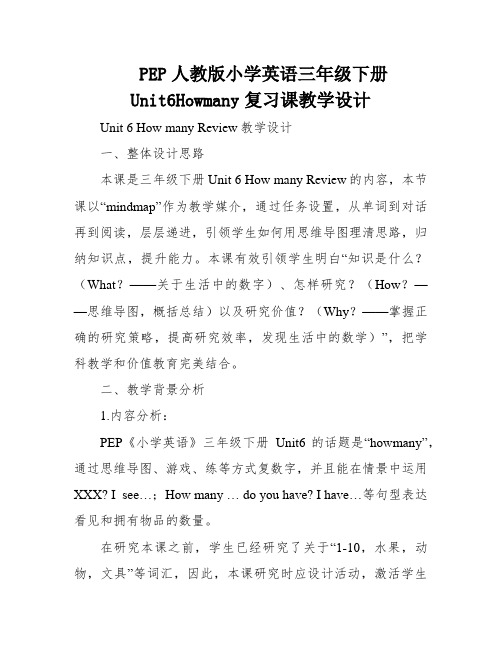
PEP人教版小学英语三年级下册Unit6Howmany复习课教学设计Unit 6 How many Review教学设计一、整体设计思路本课是三年级下册Unit 6 How many Review的内容,本节课以“mindmap”作为教学媒介,通过任务设置,从单词到对话再到阅读,层层递进,引领学生如何用思维导图理清思路,归纳知识点,提升能力。
本课有效引领学生明白“知识是什么?(What?——关于生活中的数字)、怎样研究?(How?——思维导图,概括总结)以及研究价值?(Why?——掌握正确的研究策略,提高研究效率,发现生活中的数学)”,把学科教学和价值教育完美结合。
二、教学背景分析1.内容分析:PEP《小学英语》三年级下册Unit6的话题是“howmany”,通过思维导图、游戏、练等方式复数字,并且能在情景中运用XXX? I see…;How many … do you have? I have…等句型表达看见和拥有物品的数量。
在研究本课之前,学生已经研究了关于“1-10,水果,动物,文具”等词汇,因此,本课研究时应设计活动,激活学生元认知,滚动知识,以帮助学生建构知识体系,再在此基础上,导入新课,活动知识。
另外,本课的重点句型是询问数量How many的句型回答。
本课的话题是“Number”,教师通过去公园的主线,创设情景。
首先是通过Let’s say的方式,复、汇总重点词汇。
再通过去公园撕车牌,让学生理解数字并找出规律;通过听力写出数字,巩固听的能力;通过阅读,具体了解物品的数量,用思维导图对语篇进行概括,并在此基础上进行说的练。
最后,认识生活中的数字,还原生活的本色。
本课还结合单元目标,挖掘人文价值因素,发现生活中的数学,对学生如何有效研究,提高研究效率给予指导。
2.学情分析本节课的授课对象是小学三年级的学生,他们对英语有浓厚的兴趣,活泼乐学;本课的主题是“number”,在上学期已经研究1-10的表达,这个单元在原来的基础上研究11-20,在设计时考虑到这一情况,对所学内容进行滚动、联系、拓展。
Unit 6 (单元复习课件)-七年级英语上册(人教新目标Go for it!)

➢ 三单:Does+主语+like+宾语? Yes,主语代词 does./No,主语代词
doesn’t. John喜欢他们吗?不,他不喜欢。 _D_o_es_ _J_o_h_n_li_k_e_t_h_em_ _?_ N_ _o_,_h_e_ d_o_e_s_n_’_t._ _ _ _ _ _ _ _ _ _ _ _ _
那么;所以,如此的____s_o________ 早餐___b__re__a_k_fa__st______ 作为早餐__fo__r_b__r_e_a__k_f_a_st 午餐___lu_n__c_h______ 午餐后_a_f_t_e_r_l_u_n_c_h____ 明星;星星 ___s_t_a_r_______
11. 晚餐后
____a_ft_e_r_d_i_n_n_e_r___
12. 我不想变胖。_I_d__o_n_’t_w__a_n_t_t_o_b_e__fa_t_._
03 Sentences
Sentences
Jack: Hey, John’s birthday dinner is next week. Let’s think about the food.
Cindy: I love fruit. I think it's healthy.
某人某餐喜欢吃什么?
David: OK. So what fruit do you like? Do you like bananas? 你喜欢吃什么水果?
Cindy: Well, I don't like bananas. But I like oranges and apples.
Unit 6 复习课件牛津译林版英语八年级下册

7. closely adv. 密切地 close adv. 近地 adj. 亲密的,直系的
例: 我们应该密切合作来实现我们的愿望。
_W__e__sh__o_u_ld__w_o_r_k__c_lo_s_e_ly__t_o_r_e_a_li_z_e_o_u_r__w_i_s_h______________.
support sb. support sth. support sb. to do sth. with one’s support without one’s support
例: 我认为没有你父母的帮助你是完成不了这项工作的。
I don’t think you will finish the work
It is kind of you to help me. = You are kind to help me.
It is healthy for you to take more exercise. = Taking more exercise is healthy for you.
It is generous of you to donate your money to people in need. = You are generous to donate your money to people in need.
_w_i_th_o_u_t_y_o__u_r _p_a_re_n_t_s_’_h_e_lp______________________.
活动前和活动中的互相支持和帮助是非常必要的。
It’s necessary for you _t_o__su_p__p_o_rt_a_n_d__h_e_l_p_e_a_c_h_o_t_h_e_r_____________
Unit 6 复习课 课件-2021-2022学年人教版九年级英语全册

•
eg:English was not studied (by us)every
day.
• (3)疑问句:Be(Was/Were)+主语+动词 的过去分词+(by+人称代词宾格)+其他+?
• eg:Was English not studied (by us)every day?
• 13. Dr. Naismith divided the men in his class into two teams and taught them to play his new game 奈史密斯
博士把他们班上的男生分成两队,并教他们玩他的新游戏。
• 14. At the same time, they need to stop the competing team from getting the ball into their own basket.同时, 他们需要阻止对方把篮球投入他们自己的蓝里。
• 7. It is believed that tea was brought to Korea and Japan during the 6th and 7th centuries. 人们 认为茶在6世纪和7世纪之间被带到韩国和日本。
• 8.In England, tea didn’t appear until around 1660, but less than 100 years later, it had become the national drink.在英国直到大约1660年才出 现了茶,但是不到100年的时间,它已经成为 了国饮。
→boiled adj. 沸腾过的 23. remain v.保持不变;剩余
Unit6(单元复习课件)九年级英语全一册(人教版)
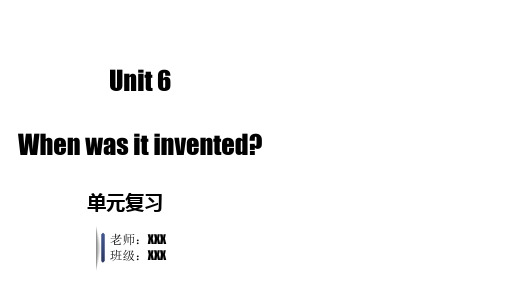
_w__a_s__/_w__e__r_e___+及物动词的过____去___分___词___。
Grammar
一般过去时被动语态的句式
句式
结构
例句
肯定句 主语+ was/ were +过去分词 He was chosen to work for the
+其他.
village.
used for? 特殊疑问句
形式
ice-cream.
Active Voice: Alexander Graham Bell invented the telephone in 1876.
Passive Voice: The telephone was invented (by Alexander Graham Bell) in 1876.
Grammar
1.主动语态变被动语态
主动变被动
Alexander Graham Bell invented the telephone in 1876.
The telephone was invented by Alexander Graham Bell in 1876.
原宾语变被动的主语,原主语变被动的宾语, 谓语动词由过去式变be+谓语动词的过去分词, 加之by引导
Who was it invented by? When was tea brought to Korea?
It was invented by Whitcomb Judson.
It was brought to Korea during the 6th and 7th centuries.
What is the hot ice-cream scoop
人教版精通版小学英语六年级上册 教学课件 第六单元复习课件
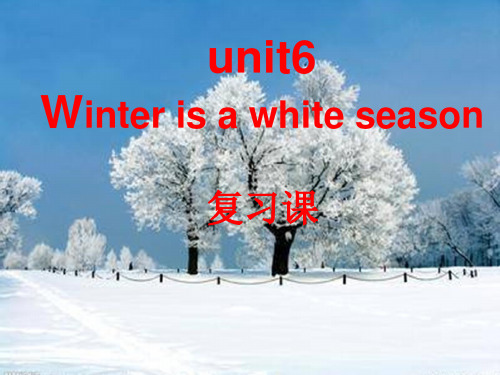
1、farm the land 2、go camping
种地 野营
3、look at the flowers
看花
4、fly kites
5、plant rice
放风筝 种水稻
6、在海滩上玩 7、找贝壳 8、摘苹果 9、喂养动物 10、做雪人
play on the beach look for shells
pick apples feed the animals make a snowman
What are they doing?
They are flying kites. They are farming the land.
They are looking at the flowers. They are going camping.
5、h_o_t
6、s_u_mm_e_r
7、ra_i_ny
8、w_i_nt_e_r
9、sn_o_w
10、_a_ntumn
fly kites
farm the land
look at the flowers
go camping
Exercises2Translate into Chinese and English
fill in the blanks.看图填空
In summer, some students
are_m_a_k_i_n_g___a__s_a_n_d_c_a_s_t.le
fill in the blanks.看图填空
In autumn, the farmers are_c_u_t_t_in_g_r_i_ce_.
It is the__h_o__tt_e_s_t__season.
Unit 6 单元复习课件-七年级英语下册同步备课系列(人教新目标Go for it!)

My parents aren’t at home. We can eat out. Laura: Yeah. I’d love to. Jenny: Let’s meet at my home first. Come at half past six. Laura: OK. See you then.
Words
10. 儿童 n. _c_h_il_d_____ 11. 可口的,美味的 adj. _d_e_l_ic_i_o_u_s 12. 房子 n. __h_o_u_s_e____ 13.希望 v. __w__is_h__ 14.出去吃 __e_a_t_o_u_t__ 15.男人,人 n. ___m_a_n____ 16.一个...另一个...__o_n__e._.._t_h_e_o_t_h_er... 17.一些...另一些..._s_o_m__e_.._.o_t_h_e_r_s_.._. 18.美国__A_m__e_r_ic_a
He isn’t reading the newspaper. 他没在看报纸。
Be (Am, Is, Are) + 主语 + v-
ing + 其他?
一般 疑问句
肯定回答:Yes, + 主语 + be.
否定回答:No, + 主语 + be
+ not.
—Are they playing soccer? 他们在踢足球吗? —Yes, they are./ No, they aren’t. 是的,他们在踢。/不,他们没在踢。
Unit 6【复习课件】-2022-2023学年七年级英语下册单元复习过过过(牛津译林版)
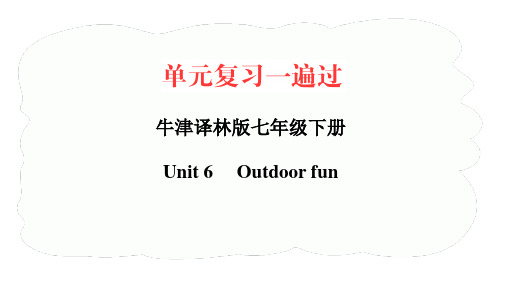
C. visited
D. visit
【解析】本题用语法判定法。考查动词时态。句意:—你 曾经参观过沈阳世博园吗?—是的,我去年参观它的。由 答句中“last year”可知,答句是一般过去时。故选C。
中考在线:—Alice has gone out.
—Oh, has she? What time _C_____ she ______?
他们担心他们的工作吗? —Yes, they were. / No, they weren’t.
是的, 他们担心。/ 不, 他们不担心。
中考在线:—My feelings for you have not changed.
—But you have changed. You are not as youB_____.
A. are
B. were
C. will be
D. have been
【解析】考查动词时态。根据答语的前句句意“但是你已 经变了”可知,后句表述“你不像你以前那样了”,用一 般过去时。故选B。
一、用所给词的适当形式填空
1. Just now, he got a call and __h_u_r_ri_e_d__ (hurry) home. 2. Miss Li __t_a_u_g_h_t__ (teach) Chinese in London 3 years ago. 3. I ___w_e_n_t___ (go) swimming last Sunday, and I _d_i_d_n_’_t_g_o_
door... 很快爱丽丝个子足够小可以穿过那个门……
一般过去时( 二)
考点1 行为动词的一般过去时的肯定句、否定句、一般疑问句及其肯、 否定回答。具体构成如下: 1) 肯定句: 主语+ 动词(过去式) + 其他. e.g. They had a picnic in the park last week. 上周他们在公园里野餐。 2) 否定句: 主语+did not+ 动词( 原形) + 其他. (did not= didn’t) e.g. We didn’t have classes yesterday. 我们昨天没有课。
八年级-人教版-英语-上册-[能力提升]Unit 6 单元复习课
![八年级-人教版-英语-上册-[能力提升]Unit 6 单元复习课](https://img.taocdn.com/s3/m/be865242b6360b4c2e3f5727a5e9856a56122680.png)
Unit 6 I’m going to study computer science. (Period 6)单元复习课Ⅰ.完成句子。
1.昨天每个人都写下了来年的计划。
Yesterday everyone _________ _________ their plans for the coming year.2.我承诺放学回来的时候整理我的房间。
I _________ I’m going to _________ my room when I get back from school.3.他们打算下个月开始一项新的研究。
They plan to _________ _________ a new study next month.4.我觉得这件事与杰克有关。
I think this thing _________ _________ _________ _________ Jack.5.七月初格林一家将启程去上海。
_________ _________ _________ _________ July, the Greens are leaving for Shanghai.Ⅰ.阅读理解。
Dear Chen Jie,How is it going? Last Monday, we talked about our dreams in the class meeting. Some students didn’t know what they wanted to be in the future. But I said that I wanted to be an English teacher.I hope to be a good teacher like Mr. Wu. He makes his math class interesting. He often tells us to work hard and try our best to achieve our dreams.What are you going to be when you grow up?Yours,Li MingDear Li Ming,Thanks for your letter. My dream is to be a voluntary (志愿的) doctor. But my parents don’t agree with me. They think the job will sometimes be very difficult. This week I wrote to my Chinese teacher, Miss Liu. I asked her for some advice. She said that a good doctor could help more people and she told me not to give up my dream. Now, I’m sure of my dream job and maybe I will go towork in a poor place one day, but I will always be your friend!Love,Chen Jie6.What did Li Ming and his classmates talk about in the class meeting?A.Their teachers.B.Their dreams.C.Their parents.D.Their friends. 7.Who wants to be a teacher?A.Chen Jie.B.Li Ming.C.Mr. Wu.D.Miss Liu. 8.What subject does Mr. Wu teach?A.Chinese.B.English.C.Math.D.P.E. 9.What do Chen Jie’s parents think of the job of a voluntary doctor?A.Very difficult.B.Very easy.C.Very interesting.D.Very boring. 10.Chen Jie wrote a letter to Miss Liu because he wanted _______.A.to give up his dream B.to be poorC.to make friends with Miss Liu D.to get some adviceⅠ.任务型阅读。
unit_6_I'm_going_to_study_computer_science._复习课
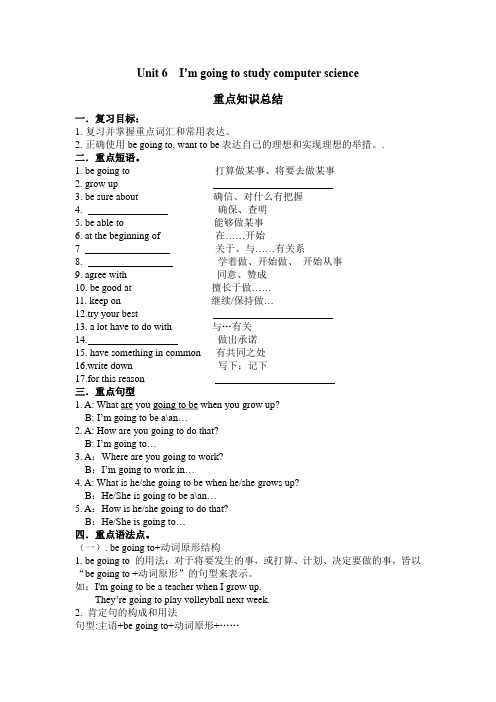
Unit 6 I’m going to study computer science重点知识总结一.复习目标:1.复习并掌握重点词汇和常用表达。
2.正确使用be going to, want to be表达自己的理想和实现理想的举措。
.二.重点短语。
1. be going to 打算做某事、将要去做某事2. grow up3. be sure about 确信、对什么有把握4. 确保、查明5. be able to 能够做某事6. at the beginning of 在……开始7 关于、与……有关系8. 学着做、开始做、开始从事9. agree with 同意、赞成10. be good at 擅长于做……11. keep on 继续/保持做…12.try your best13. a lot have to do with 与…有关14. 做出承诺15. have something in common 有共同之处16.write down 写下;记下17.for this reason三.重点句型1. A: What are you going to be when you grow up?B: I’m going to be a\an…2. A: How are you going to do that?B: I’m going to…3. A:Where are you going to work?B:I’m going to work in…4. A: What is he/she going to be when he/she grows up?B:He/She is going to be a\an…5. A:How is he/she going to do that?B:He/She is going to…四.重点语法点。
(一). be going to+动词原形结构1. be going to 的用法:对于将要发生的事,或打算、计划、决定要做的事,皆以“be going to +动词原形”的句型来表示。
Unit6Survival单元复习课件-高中英语选择性

12.According to a recent study in the Journal of Consumer Research, both the size and consumption (consume) habits of our eating companions can influence our food intake.
使……处于控制之下 应付 摆脱 彻底摧毁,消灭 由……构成,由……组成 在此期间,与此同时
四、经典句式 1.“only+状语”置于句首引起的部分倒装句
Only then can we look towards (我们才能展望) harmoniously sharing our urban habitats. 2.动词不定式短语作表语 One option is to explore other planets (探索其他星球) to see if we could live on them. 3.替代词 The most likely choice is Mars, which is relatively close to Earth and has an environment less hostile than that of other planets (其他行星的环境).
濒危物种名录 登陆月球 地球的大气层 火山喷发 适应变化 季节性迁徙 寻找生命迹象 宇宙的起源 一项科学发现 主要食物来源 拍摄地球的照片
20.send more satellites into space 21.immune system 22.reduce the power to resist disease 23.send unmanned spacecraft to Mars 24.natural predator 25.construction waste 26.the solar system 27.feed on plants 28.rare plants 29.take on the colour of its surroundings 30.change their migratory routes
牛津译林版Unit6Keepourcityclean复习课件

垃圾
10.messy 邋遢的,乱七八糟的
11.dead 12.bin
死的 垃圾桶
重点单词
13.plant 种植,栽种 14.more 更多的
15.throw 16.skin
扔 果皮
重点单词
17.slip 18.fall
滑倒 摔倒
重点短语
1. keep our city clean 2.move…away from 3.pick…up
We can put rubbish in the bin. 我们可以把垃圾放进垃圾桶.
重点句型
We can plant more trees. 我们可以种更多的树.
重点语法
can的句型结构
肯定句:主语+can+动词原形+其他. 否定句:主语+can”t+动词原形+其他. 一般疑问句:Can+主语+动词原形+其他? 肯定回答:Yes,主语+can. 否定回答:No, 主语+can”t. 特殊疑问句:特殊疑问词+can+主语+动词原形+其他?
重点句型
1. What makes the streets messy and dirty? 什么使街道变得又乱又脏?
2.What can we do to keep our city clean? 我们可以做什么来保持我们的城市整洁?
重点句型
We can move some factories away from oUnit 6 Keep our city clean
第六单元
重点单词
重点短语
重点句型
重点语法
重点单词
1.keep 2.clean
六年级上册英语教案《Unit6 How do you feel-8 Revision》人教(PEP)

六年级上册英语教案《Unit6 How do you feel-8 Revision》人教(PEP)一. 教材分析本课是PEP教材六年级上册的第六单元《How do you feel》的复习课。
本节课主要让学生复习和巩固本单元的主要知识点,包括描述情绪的词汇和表达情绪的方式。
通过复习,使学生能够熟练运用所学知识,提高他们的语言运用能力。
二. 学情分析六年级的学生已经具备了一定的英语基础,对本单元的知识点有了一定的了解。
但部分学生在表达情绪时,可能会受到母语的影响,无法准确地用英语表达。
因此,在教学过程中,教师需要关注学生的个体差异,给予他们充分的练习机会,提高他们的语言运用能力。
三. 教学目标1.知识目标:学生能够熟练掌握描述情绪的词汇,如happy, sad, angry,tired等,并能用英语表达自己的心情。
2.能力目标:学生能够通过听、说、读、写等多种方式,运用所学知识进行交流和表达。
3.情感目标:学生能够关心他人的情绪,学会用英语安慰和鼓励他人。
四. 教学重难点1.重点:学生能够准确地使用描述情绪的词汇进行表达。
2.难点:学生能够灵活运用所学知识,与他人进行流利的交流。
五. 教学方法本节课采用任务型教学法,通过各种任务活动,让学生在实践中学习、巩固和运用所学知识。
同时,运用分组合作学习法,培养学生团队合作精神,提高他们的语言运用能力。
六. 教学准备1.教师准备:准备好相关的教学材料,如PPT、图片、卡片等。
2.学生准备:学生提前复习本单元的知识,做好上课的准备。
七. 教学过程1.导入(5分钟)教师通过与学生谈论日常生活中的情绪,引导学生谈论自己的情绪,为新课的学习营造轻松的氛围。
2.呈现(5分钟)教师通过出示图片或情境,引导学生用英语表达图片中人物的情绪。
如:展示一张开心的人物图片,问学生:“How does he feel?”学生回答:“He feels happy.”3.操练(10分钟)教师学生进行小组活动,让学生互相描述自己的情绪,并用英语表达出来。
- 1、下载文档前请自行甄别文档内容的完整性,平台不提供额外的编辑、内容补充、找答案等附加服务。
- 2、"仅部分预览"的文档,不可在线预览部分如存在完整性等问题,可反馈申请退款(可完整预览的文档不适用该条件!)。
- 3、如文档侵犯您的权益,请联系客服反馈,我们会尽快为您处理(人工客服工作时间:9:00-18:30)。
单元复习课
点击进入相应模块
单元评价检测
单元评价检测
单元评价检测
单元评价检测
Ⅰ. 词汇拓展 1. shop(v. ) 2. man(n. ) 3. young(adj. ) 4. child(n. ) 答案:1. shopping →_____(现在分词) →_____ (pl. ) →_____ (比较级) →_____ (pl. ) 2. men 3. younger 4. children
C. prepare
D. prepared
【解析】选 A 。考查动词时态。根据时间状语 now 可知强调现
在正在发生的事情,要用现在进行时。
单元评价检测
2. (2012· 阜康中考)—Is Jack in the classroom now?
—No, he _____ football on the playground.
【解析】选C。考查动词时态。根据上句句意“嘘,保持安静! 婴儿正在隔壁房间睡觉。”可知,该用现在进行时 be+doing形 式,故答案为C。
单元评价检测
5. (2012· 成 都 中 考 )Look! Peter _____ TV happily, but his parents are busy in the kitchen. A. is watching B. watches C. watched
10. 一张我的全家福
单元评价检测
Ⅲ. 句型攻关
1. ——你在干什么?——我在看电视。
— _____ _____ you doing?
—I’m _____ TV.
答案:What are; watching
单元评价检测
2. ——你在使用电脑吗? ——是的,我在用。/不,我没有。 — _____ you _____ the computer? —_____ , I am. /No, I’m . 3. 朱辉一家人为什么一边看龙船赛,一边包粽子? _____ _____ Zhu Hui’s family _____ boat races and _____ zongzi? 答案:2. Are; using; Yes; not 3. Why are; watching; making
【解析】选A。考查动词时态。根据Look!可知,强调动作正 在进行,故选A。
单元评价检测
单元评价检测
单元评价检测
A. plays B. played
C. is playing
D. was playing
【解析】选C。考查动词时态。由问句句意“现在杰克在教室
里吗?”可知,问的是现在正在做的事情。故用现在进行时。
故选C。
单元评价检测
3. (2012· 孝感中考)—Could you help me do the dishes?
—Sorry, my sister _____ for me outside now.
A. waits B. will wait
பைடு நூலகம்
C. is waiting
D. was waiting
【解析】选 C 。考查动词时态。根据时间状语 now 可知要用现
在进行时。
单元评价检测
4. (2012· 衢州中考)—Ssh, be quiet! The baby _____ in the next room. —Oh, sorry. A. sleeps C. is sleeping B. slept D. was sleeping
单元评价检测
6. 几点 7. 在六点半 8. Dragon Boat Festival 9. wish to do sth. 10. a picture of my family 答案:6. what 9. 希望做某事 7. at half past
_____ time _____ _____ _____ six _____________ _____________ _____________ 8. 端午节
单元评价检测
5. miss(v. ) 6. run (v. ) 7. write(v. ) 答案:5. misses
→_____(第三人称单数) →_____ (现在分词) →_____ (现在分词) 6. running 7. writing
单元评价检测
Ⅱ. 短语互译 1. 看电视 2. 看报 3. 听CD 4. 打篮球 5. 喝茶 答案:1. watch 5. drink/have _____ TV _____ a newspaper _____ _____ a CD play _____ ______ tea 2. read 3. listen to 4. basketball
单元评价检测
核心考点:一种时态
现在进行时
单元评价检测
1. (2012 · 黄石中考)Tomorrow is Dragon Boat Day. My mother
and my grandma _______ a big meal for our family now.
A. are preparing B. be preparing
